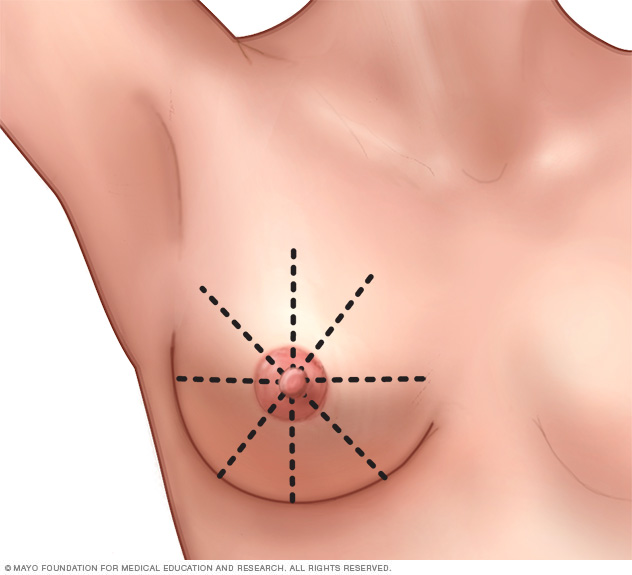Rochester, Minnesota - A breast cancer diagnosis can be overwhelming. And just when you're trying to cope with the shock and the fears about your future, you're asked to make important decisions about your treatment.
Every person finds his or her own way of coping with a cancer diagnosis. Until you find what works for you, it might help to:
-
Learn enough about your breast cancer to make decisions about your care. If you'd like to know more about your breast cancer, ask your doctor for the details of your cancer - the type, stage and hormone receptor status. Ask for good sources of up-to-date information on your treatment options.
Knowing more about your cancer and your options may help you feel more confident when making treatment decisions. Still, some women may not want to know the details of their cancer. If this is how you feel, let your doctor know that, too.
- Talk with other breast cancer survivors. You may find it helpful and encouraging to talk to others in your same situation. Contact the American Cancer Society to find out about support groups in your area and online.
- Find someone to talk about your feelings with. Find a friend or family member who is a good listener, or talk with a clergy member or counselor. Ask your doctor for a referral to a counselor or other professional who works with cancer survivors.
-
Keep your friends and family close. Your friends and family can provide a crucial support network for you during your cancer treatment.
As you begin telling people about your breast cancer diagnosis, you'll likely get many offers for help. Think ahead about things you may want assistance with, whether it's having someone to talk to if you're feeling low or getting help preparing meals.
- Maintain intimacy with your partner. In Western cultures, women's breasts are associated with attractiveness, femininity and sexuality. Because of these attitudes, breast cancer may affect your self-image and erode your confidence in intimate relationships. Talk to your partner about your insecurities and your feelings.
Prevention

Breast self-exam
To perform a breast self-exam for breast awareness, use a methodical approach that ensures you cover your entire breast. For instance, imagine that your breasts are divided into equal wedges, like pieces of a pie, and sweep your fingers along each piece in toward your nipple.
Breast cancer risk reduction for women with an average risk
Making changes in your daily life may help reduce your risk of breast cancer. Try to:
-
Ask your doctor about breast cancer screening. Discuss with your doctor when to begin breast cancer screening exams and tests, such as clinical breast exams and mammograms.
Talk to your doctor about the benefits and risks of screening. Together, you can decide what breast cancer screening strategies are right for you.
-
Become familiar with your breasts through breast self-exam for breast awareness. Women may choose to become familiar with their breasts by occasionally inspecting their breasts during a breast self-exam for breast awareness. If there is a new change, lumps or other unusual signs in your breasts, talk to your doctor promptly.
Breast awareness can't prevent breast cancer, but it may help you to better understand the normal changes that your breasts undergo and identify any unusual signs and symptoms.
- Drink alcohol in moderation, if at all. Limit the amount of alcohol you drink to less than one drink a day, if you choose to drink.
- Exercise most days of the week. Aim for at least 30 minutes of exercise on most days of the week. If you haven't been active lately, ask your doctor whether it's OK and start slowly.
-
Limit postmenopausal hormone therapy. Combination hormone therapy may increase the risk of breast cancer. Talk with your doctor about the benefits and risks of hormone therapy.
Some women experience bothersome signs and symptoms during menopause and, for these women, the increased risk of breast cancer may be acceptable in order to relieve menopause signs and symptoms.
To reduce the risk of breast cancer, use the lowest dose of hormone therapy possible for the shortest amount of time.
- Maintain a healthy weight. If your weight is healthy, work to maintain that weight. If you need to lose weight, ask your doctor about healthy strategies to accomplish this. Reduce the number of calories you eat each day and slowly increase the amount of exercise.
- Choose a healthy diet. Women who eat a Mediterranean diet supplemented with extra-virgin olive oil and mixed nuts may have a reduced risk of breast cancer. The Mediterranean diet focuses mostly on plant-based foods, such as fruits and vegetables, whole grains, legumes, and nuts. People who follow the Mediterranean diet choose healthy fats, such as olive oil, over butter and fish instead of red meat.
Breast cancer risk reduction for women with a high risk
If your doctor has assessed your family history and other factors and determined that you may have an increased risk of breast cancer, options to reduce your risk include:
-
Preventive medications (chemoprevention). Estrogen-blocking medications may help reduce the risk of breast cancer. Options include tamoxifen and raloxifene (Evista). Aromatase inhibitors have shown some promise in reducing the risk of breast cancer in women with a high risk.
These medications carry a risk of side effects, so doctors reserve these medications for women who have a very high risk of breast cancer. Discuss the benefits and risks with your doctor.
- Preventive surgery. Women with a very high risk of breast cancer may choose to have their healthy breasts surgically removed (prophylactic mastectomy). They may also choose to have their healthy ovaries removed (prophylactic oophorectomy) to reduce the risk of both breast cancer and ovarian cancer.
